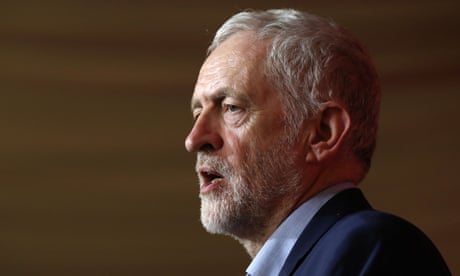Is Jeremy Corbyn’s inner circle plotting to replace him? Will he go before the 2020 election or will he stick it out? These questions may sound appealing, but do they miss the point of Corbyn? Is he the person who will take the Labour party to where many want it to be? Because Corbyn’s leadership isn’t solely about him: it’s about the left’s long-term goals of transforming Labour into a leftwing populist party. The kind of party many have long yearned for.
Over the weekend, rumours began to swirl about whether Corbyn’s departure was imminent when it emerged that Labour had been testing the appeal of frontbenchers in the north of England. Despite the tone of some of the reporting, it’s normal for political parties to try to get an idea of how people in different parts of the country perceive shadow ministers. But while these reports captured the headlines, another more telling piece of Labour news received far less attention: the fight over whether the “McDonnell clause” will pass at Labour conference.
Were someone from another wing of the party to take over as leader, the problems that plague Labour would remain
The clause is a change to the leadership rules that would lower the number of nominations leadership candidates need from MPs to get on the ballot paper – something the bulk of the parliamentary party opposes. Their efforts to stop a leftwing successor making it on to the ballot should Corbyn resign – thereby denying members the right to vote for such a candidate – were bolstered over the weekend through two internal elections for conference delegates. This is a struggle within the party that many activists see as far more important than the last two leadership contests; it’s one that will define Labour’s long-term future identity as either a party that manages the status quo or one that pushes for radical change.
----Also read
Jeremy's Anthem for 2017
-----
Corbyn’s victories in 2015 and 2016 were a symbol of a move towards a more progressive Labour party; he was saying things that my generation had never heard uttered by a mainstream, frontline politician. But his leadership has been spoken about as if it were some sort of power grab made possible by crazed Trotsky entryists. In his book on Corbyn’s move from the back to the front benches, Richard Seymour charts how this rise was made possible by Labour’s long-term decline and a wider crisis in parliamentary democracy.
Corbyn’s leadership must be set against a history of plummeting interest in parliamentary politics, and the rapidly expanding disconnect between the state and the people. This sense of disenfranchisement has been exploited by the far right and was made possible by New Labour’s years in power. Their aim wasn’t to transform the political system; they chose to ameliorate the symptoms of the free-market economy, which handed power to corporations at the expense of people, rather than try to change its structures. Similar policies across Europe have led to struggles for all social democratic parties – Corbyn offered an alternative route.

Recognising this context does not mean ignoring Labour’s current woes, not least their confused approach to Brexit. Take immigration. It’s one of the main issues dragging British politics to the right. While certain MPs have remained adamant that they must listen to voters’ “legitimate concerns” over immigration, even when those concerns are unfounded, Labour’s current leadership has not yet offered a strong pro-migration message. Many Corbyn supporters have been pressuring them to do so. The left’s aim isn’t to maintain an uncritical defence of Corbyn but to keep working at the project that was started when he was elected leader – that is, breaking with an economic consensus that breeds inequality, and crafting a leftwing form of populism that speaks to people without scapegoating migrants.
Were someone from another wing of the party to take over as leader, the problems that plague Labour would remain. The old tactics of managing the country’s problems, instead of trying to solve them, wouldn’t suffice.
Given the challenges facing Labour and Corbyn, there is a propensity for people on the left to fall into despair. But the long-term goal is transformation. While Corbyn’s election in 2015 and then again in 2016 felt like the way to achieve this, his supporters have realised it was only the beginning, and that Corbyn is an essential part of the journey as the left seeks to cement much-needed change within the Labour party.
